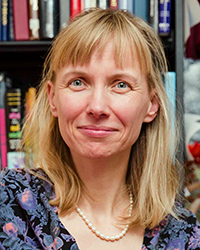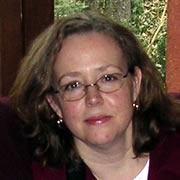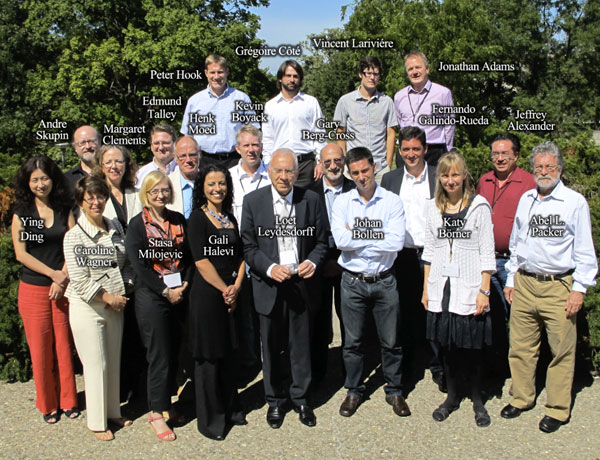Workshops
JSMF Workshop on Standards for Science Metrics, Classifications, and Mapping
Date:
August 11-12, 2011
Meeting Place:
School of Library and Information Science, Indiana University
1320 E. 10th St., Wells Library, Room: 001
Bloomington, IN 47405
Indiana University Campus Map »
Photos:
Organizers:

Katy Börner
Victor H. Yngve Professor of Information Science, School of Library and Information Science, Indiana University, Bloomington;
Director, Cyberinfrastructure for Network Science Center; Curator, Places & Spaces: Mapping Science exhibit, katy@iu.edu
PR^2 | VIVO | Slides

Workshop Goals & Agenda:
This 1 ½ day workshop brings together researchers and practitioners interested in the scientific development and proper usage of science metrics, science classifications, and science maps. Demonstration of existing approaches, tools, and techniques will provide a point of departure for a discussion of challenges and opportunities for developing scientifically sound standards for measuring and communicating the structure and dynamics of science and technology (S&T).
Among others, we will discuss:
S&T Metrics
- Strengths, weaknesses, and limitations of existing output and impact indicators.
- Properties that a good indicator of productivity and impact should have.
- What types of normalization should be performed to account for different disciplines?
- Skewness of distributions and scaling effects.
- Coverage of various databases
- Let’s explicitly avoid University Ranking systems (we don’t want the conversation to devolve into this area)
S&T Classifications
- Strengths, weaknesses, and limitations of existing classifications in bibliometric/science mapping context;
- Properties a good classification should have in a science mapping context.
- Properties a good classification should have in a metrics context. Are classification properties for science mapping and metrics compatible?
- Development new classifications at the paper level that takes into account the nature / methods / objects of disciplines (and history, etc.), but also their citation characteristics;
- Dynamically evolving classifications that can capture data from 1900-today.
- How to classify interdisciplinary papers/journals.
S&T Mapping Standards
- Strengths, weaknesses, and limitations of existing science maps;
- Properties a good science maps and existing/emergent standards that help harmonize existing academic/government/industry standards.
- Align S&T classifications/maps with other ontologies, taxonomies to support cross-walks and mapping.
Cross-Cutting
- Discuss setup of an international 'interest group' that reviews and approves new standards as they become available, analogous to what is common in Semantic Web community.
- Write joint publication in major journal that reviews state of the art and promotes desirable futures.
Given the diverse backgrounds of the participants and the goals of the workshop, we will start with brief self-introductions; followed by three 30 min overview talks that set the stage for the workshop; and then brainstorming and discussion sessions in different team sizes and combinations.

If you would like to follow the workshop live, follow us on Twitter with the hashtag: #standards2011
Schedule:
Thursday, August 11, 2011
| 12:00pm | Welcome by Organizers (Katy Börner and Vincent Lariviare) |
| 12:15pm | Introduction by Participants (7 min per person/organization) |
| 3:00pm | Break |
| 3:30pm | Overview Talks (15-20 mins plus 5 mins discussion each
|
| 5:00pm | Break |
| 5:30pm | Discussion of Opportunities and Challenges |
| 7:00pm |
Joint dinner at Farm brainstorm in preparation for Friday |
Friday, August 12, 2011
| 8:45am | Breakfast |
| 9:30am | Breakout Session on "Metrics, Classifications and Mapping" [Session 1 | Session 2 | Session 3] |
| 10:30am | Breakout Session Reports |
| 11:00am | Break |
| 11:30am | Second Best Ideas |
| 12:30pm | Joint Working Lunch |
| 1:00pm | Breakout Session on "Evolving Standards" [Session 1 | Session 2 | Session 3] |
| 2:30pm | Breakout Session Reports |
| 3:15pm | Break |
| 3:30pm | Interactive Timeline Assembly |
| 4:30pm | Planned Collaborations |
| 5:00pm | Adjourn |
Participants Attending:



Johan Bollen
Associate Professor of Informatics, School of Informatics and Computing, Indiana University, Bloomington, IN
PR^2

Margaret Clements
Visiting Faculty, School of Library and Information Science and School of Education, Indiana University, Bloomington
PR^2


Fernando Galindo-Rueda
Senior Economist, OECD
PR^2




Henk Moed
Senior Scientific Advisor, Elsevier
PR^2

Abel L. Packer
SciELO Project, Foundation of the Federal University of São Paulo
PR^2

Nigam Shaha
Assistant Professor, Stanford University
PR^2

Andre Skupin
Associate Professor of Geography, San Diego State University
PR^2 | Slides


Edmund Talley
Program Director, Channels Synapses and Circuits Cluster, National Institute of Neurological Disorders and Stroke
PR^2

Caroline Wagner
Milton & Roslyn Wolf Chair of International Affairs Director, Battelle Center for Science and Technology Policy, Ohio State University
PR^2
Interested But Cannot Attend:

Eric Archambault
President and CEO, Science-Metrix

Lynda Carlson
NCSES Director, National Science Foundation

Yuko Harayama
Deputy Director of the OECD’s Directorate for Science, Technology and Industry (STI)

Jim Hendler
Professor, Computer Science and Cognitive Science, Rensselaer, Polytechnic Institute, Troy, NY and Tetherless World Constellation

Igami Matsatsura
Senior Researcher, National Institute of Science and Technology Policy (NISTEP)

Mark Musen
Professor of Medicine (Biomedical Informatics); Division Head (BMIR); Co-Director, Biomedical Informatics Training Program, Stanford Center for Biomedical Informatics Research
References
Travel/Housing:
Please contact Samantha Hale (sjhale@iu.edu) to arrange travel.
Directions:
See the contact page for the Cyberinfrastructure for Network Science Center, http://cns.iu.edu/contact.html or contact Samantha Hale (ude.anaidni@elahjs).
Acknowledgments:
This effort is supported by the James S. McDonnell Foundation and Cyberinfrastructure for Network Science Center at Indiana University.
db page











